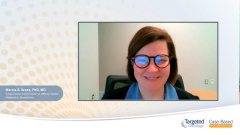
Treatment Selection for Patients With RAI-R-DTC
An expert on radioiodine-refractory differentiated thyroid cancer outlines factors to consider when selecting appropriate treatments for patients.
Episodes in this series

Case: A 43-Year-Old Man with RAI-R-DTC
Initial presentation and initial treatment:
- A 43-year-old man presents with fatigue, neck pain and dysphagia and was diagnosed with papillary thyroid carcinoma 10 years ago
- Following a total thyroidectomy, he underwent multiple rounds of radioactive ablation therapy.
- Initial response was positive with undetectable thyroid globulin levels and negative imaging
- PMH: Hyperlipidemia; Hypertension; Diabetes (controlled with medications)
- SH: lives with his wife and 2 teenage children; non-smoker and drinks alcohol occasionally
- PE: appears fatigued with a palpable thyroid nodule in the left lobe
- Neck examination: palpable mass in the left neck, and cervical lymphadenopathy
Clinical workup
- Labs: WNL
- Neck ultrasound: Identifies a large, irregular mass in the left thyroid bed with invasion into surrounding structures.
- CT of the neck and chest revealed neck mass along with multiple pulmonary nodules, largest 2cm x 1.5cm
- TSH: Within normal limits
- Thyroglobulin levels: Markedly elevated
- Radioactive iodine scan: Confirms radioiodine refractory disease with widespread involvement of cervical lymph nodes and distant metastases.
- Needle biopsy was performed which confirmed Papillary thyroid cancer. Next-generation sequencing was negative for mutations, rearrangements
Subsequent treatment and follow-up
- Lenvatinib 24mg po qd was initiated
This is a video synopsis/summary of a Case-Based Peer Perspectives featuring Marcia S. Brose, MD, PhD.
Brose discusses factors to consider when choosing treatment for patients with radioiodine-refractory differentiated thyroid cancer (RAI-R-DTC). Although lenvatinib is her preferred first-line treatment, some question its use in older patients due to potential blood pressure issues. However, data from the DECISION trial showed an overall survival benefit in patients over 60 years old, suggesting that age alone should not preclude the use of lenvatinib. Frailty may be a consideration, but it is often related to the cancer rather than age. Brose recommends starting with the full 24 mg dose of lenvatinib and adjusting as needed, except for extremely frail patients.
Blood pressure control is crucial before initiating lenvatinib, and if it proves challenging, sorafenib may be considered as an alternative. For patients with RET fusions, selective inhibitors such as selpercatinib or larotrectinib are preferred. However, for BRAF-mutated patients, lenvatinib remains the first-line treatment of choice, with BRAF inhibitors reserved for later lines of therapy. Cabozantinib is also approved and considered standard of care in the second-line setting.
Video synopsis is AI-generated and reviewed by Targeted Oncology™ editorial staff.










































